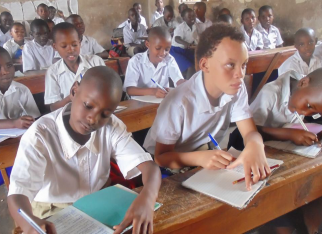HHF Africa Journal Part 2
A Visit to Kasangati Prison
by Christopher Buck
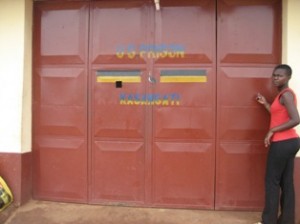 “Dare to reach out your hand into the darkness, to pull another hand into the light.”
“Dare to reach out your hand into the darkness, to pull another hand into the light.”
~ Norman B. Rice
It didn’t look very impressive. No watch towers. No high walls. No imposing barred doors clanging shut behind you with a peal of impending doom.
Just a simple beige building with a burgundy metal roof. Seemed a little unimpressive. I looked down the side at the compound behind and saw a simple barbed wire fence. I was surprised. “How do they keep people from slipping through the fence?”, I wondered. The answer turned out to be simple. First, the prisoners are rarely let out of the cells. Second, if you get to close to the fence, you are shot. Life doesn’t have much value in a Ugandan prison.
My recent trip to Uganda had many objectives for such a short time. We had come to Kasangati Prison for two: to get a better understanding of the challenges HHF and HHF-A will face working with Human Rights and Prison Initiatives in Uganda and to distribute bread and soap to the inmates as a gesture of goodwill. Soap is rarely given to the prisoners, bread never.
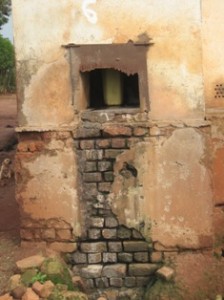 We met with the Warden, who I found to be open and honest about conditions at the prison and the penal system of Uganda. I learned about the difficult situation he faced trying to provide the minimum of basic Human Rights in an overcrowded system with a budget barely large enough to insure the lights stay on and that there is food for the inmates. At the very top of his list were manual toilets to improve sanitation and cut down on disease. Currently, each group cell has an open Jerry can that is dumped once a day. Other items on his “wish list” were:
We met with the Warden, who I found to be open and honest about conditions at the prison and the penal system of Uganda. I learned about the difficult situation he faced trying to provide the minimum of basic Human Rights in an overcrowded system with a budget barely large enough to insure the lights stay on and that there is food for the inmates. At the very top of his list were manual toilets to improve sanitation and cut down on disease. Currently, each group cell has an open Jerry can that is dumped once a day. Other items on his “wish list” were:
- Better fencing so prisoners could spend more time outside of their cells.
- Medical supplies. They have a nurse, but no medicine or supplies. Their only option is to send the inmate to the hospital at Luzira Maximum National Prison if the situation is life-threatening, but, as he pointed out, they have no supplies either.
- Better organized inmate tracking in the legal system so that he knows when an inmate has served his time and can be released. Prisoners often serve beyond their sentences.
- Educational assistance for inmates so that when they are released, they have a better chance of finding work and reintegrating themselves back into society and not just end up back in prison.
- A vehicle for transporting prisoners to their trials. Currently, inmates are hired out by the prison in work gangs. The money earned is supposed to pay for their transportation to trial, but if they are not hired or have not earned enough, prisoners miss their trials. As a result, they can be held indefinitely without a trial and formal sentence handed down. I will write more about this in the next blog.
- Their own bore-hole for water. They currently are on city water, but when that goes down, inmates receive no water.
- Blankets (yes, it does get cold in Uganda – at least relatively) and bedding for female inmates.
- Feminine hygiene products for the female inmates.
- A better system for female inmates with small children. Currently, if no family steps forward to care for the child during the mother’s incarceration, the child will stay with the mother in her cell – hardly a safe healthy environment for an infant or toddler.
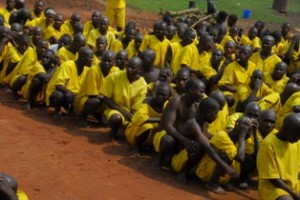 After the meeting, which I have to admit left me a little daunted, we headed out into the compound. The prisoners were squatting in lines before their cells. After David Lubaale, the Director of Africa Operations, addressed them in Luganda, we began to pass out the bars of
After the meeting, which I have to admit left me a little daunted, we headed out into the compound. The prisoners were squatting in lines before their cells. After David Lubaale, the Director of Africa Operations, addressed them in Luganda, we began to pass out the bars of
soap. Many faces shown with gratitude at this simple human kindness, but many of the eyes I saw were dead and I knew that the inmate had given up hope and was just waiting to die. While the soap offered the luxury of a chance to be clean, plain bread was something the inmates never saw, and only the one’s with dead eyes did not cheer.
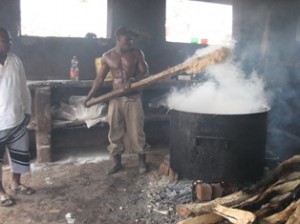 The inmates eat something called posho, which is essentially low-grade corn flour and water cooked in a giant pot. Some inmates ate their bread furiously as if in fear of losing it, while others ate so slowly, you knew that they were thoroughly savoring every crumb. I was told later that many turned down the daily meal of posho after having the bread in mild protest to the food they receive there. In case you are wondering, it tastes as good as it looks in the picture.
The inmates eat something called posho, which is essentially low-grade corn flour and water cooked in a giant pot. Some inmates ate their bread furiously as if in fear of losing it, while others ate so slowly, you knew that they were thoroughly savoring every crumb. I was told later that many turned down the daily meal of posho after having the bread in mild protest to the food they receive there. In case you are wondering, it tastes as good as it looks in the picture.
After the bread distribution, I was asked by the warden to share a message of encouragement with the prisoners. I have been told that my best speeches are short ones, so with David translating, I shared a brief message.
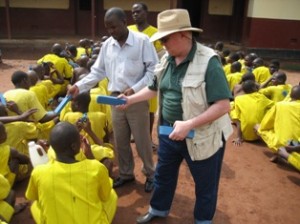 I told them that HHF believes that no matter what we are on the outside, that inside we are all one humanity. I told them to remember that while it was correct that people serve time in prison when they commit crimes, they were still human beings. I told them that they were not forgotten, and that there were people outside the walls that cared. And I told them what I expected in thanks for the soap and bread: that one day they would meet someone in need of a kindness and to remember this day and pay my kindness forward.
I told them that HHF believes that no matter what we are on the outside, that inside we are all one humanity. I told them to remember that while it was correct that people serve time in prison when they commit crimes, they were still human beings. I told them that they were not forgotten, and that there were people outside the walls that cared. And I told them what I expected in thanks for the soap and bread: that one day they would meet someone in need of a kindness and to remember this day and pay my kindness forward.
Afterwards, the inmates were returned to the cells (approximately 40 per cell) and we were able to speak directly with individuals through the bars of the doors. We also toured the rest of the facilities, seeing the kitchen were the posho (which smells foul, by the way) and the official women’s compound, which is empty as there are no funds to finish and roof it. The women are currently placed in one cell at the end of the men’s cells (causing more crowding with the men) and kept isolated from them.
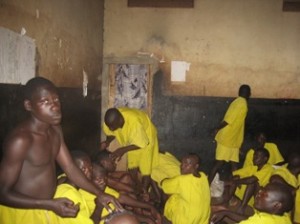 To say that my visit to Kasangati Prison was an eye-opening experience is a serious understatement. Humanity Healing Foundation and HHF – Africa believe in the rehabilitation, reconciliation and reintegration of former inmates back into society as productive members. We see this not only as a means to lift individuals, but as an essential public safety issue. Our initiatives in Uganda will have no existing structure to build on. We will have to create it.
To say that my visit to Kasangati Prison was an eye-opening experience is a serious understatement. Humanity Healing Foundation and HHF – Africa believe in the rehabilitation, reconciliation and reintegration of former inmates back into society as productive members. We see this not only as a means to lift individuals, but as an essential public safety issue. Our initiatives in Uganda will have no existing structure to build on. We will have to create it.
Our mission to the prison did result in one incredible sign of Hope. In the next blog, I will share with you the story of Richard Jumba and how HHF-A will be developing the Prison Initiatives in Uganda.


